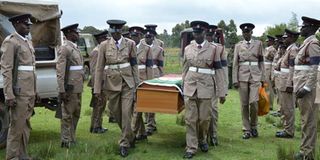Juniors accuse their bosses of exposing them to hardships

Administration Police officers carry the remains of their colleague, Constable Ezekiel Chege, during burial in Losogwa near Nyahururu on November 6, 2014. Ezekiel was among the 20 officers killed by bandits in an ambush at Kapedo. PHOTO | STEVE NJUGUNAH |
What you need to know:
- Commanders do not always act in best interest of their teams.
- Poor pay, lack of food and water among the many challenges that those working in insecure areas face.
On the morning of Saturday, November 1, 2014, Kenya woke up to the news of the massacre of 21 police officers and three civilians by bandits in Kasarani on the Kapedo-Lokori road in Turkana East.
The officers — most drawn from the Administration Police — had been sent to the area just days after three General Service Unit officers were killed and their vehicles set ablaze as they were escorting examination papers to Kapedo.
An officer who survived the massacre recounting the events of that day to the Nation, said they had been sent to tow the vehicle that had been burnt during the previous attack.
“We had been in the company of our commanders, Regular police officers and some leaders from the area and after we had spotted the car and we were strategising on how to tow it, some members of our team including the commander left to patrol Lomelo,” he said.
In all, there were about 29 Administration Police officers, police reservists and staff from Toyota Kenya. Just after tying the burnt vehicle for towing, they were attacked by bandits, who sprayed their vehicle with bullets. It was around 3pm.
“We were surrounded by hundreds of bandits without our knowledge. They had been hiding in the thickets and we only heard their voices when they were shouting as they shot at us,” the officer said.
He said only survived because he hid under the police vehicle and played dead until the gunshots went silent and the raiders took guns from the officers.
“When everything was silent and I was sure the raiders had left, I came out of the vehicle and the sight of my colleagues lying lifeless in pools of blood broke me. Some of those who survived with bullet wounds called out for help. I have never seen police officers that desperate,” he said.
He claimed that after the attack, he tried contacting the other police officers who left the scene earlier but without success.
“Together with three officers who were hurt but still able to communicate, we called all the commanders whose contacts we had. At that point, some officers were in critical condition and we thought they could still be saved but they all died later,” the officer recalled.
For the next 25 hours, the officers called for help using their phones and official radio communication equipment in vain. Officers at police headquarters at Vigilance House received the report almost immediately the bandits left the area. One of the four officers who had been making the calls for help later died.
AGEING VEHICLES
Every operation is headed by an Operation Commander. However, not all commanders accompany their teams to the ground.
One officer deployed to Kapedo said that besides lacking the equipment they need to combat bandits, officers in operation zones have to make do with ageing vehicles.
“When we are given new vehicles, the bosses use them for their missions,” said the officer.
He said that their commander, a Superintendent of Police, never set foot in Kapedo when the operation was ongoing.
“He was always in Nairobi or his home area with the official vehicle. He was not even aware of what we were going through and he was not familiar with the situation on the ground. Junior officers do not report anything to the police headquarters for fear of victimisation,” he said.
According to him, the officers were promised Sh2,000 per day but this pledge is seldom honoured. New recruits often bear the brunt and only receive a small fraction of their entitlement.
“It is not easy here. We have to cook for ourselves and sometimes the food delays and we have to rely on what we have in our pockets. The hardest part is having to go for patrols without food. And for you to eat, you have to collect firewood and cook for yourselves. Again, it is a risky affair because the bandits walk in large numbers and they are always after our guns. To get the guns, they have to kill you before you kill them,” the officer said.
Besides food, water is also a problem and the officers have to go for long distances to get their supplies. They are routinely denied days off largely because they are understaffed and their commanders are not always available to grant them leave.





